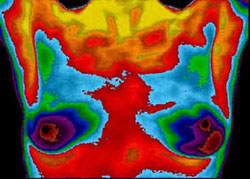|

One in forty-eight women in Honolulu will be diagnosed with breast cancer in their lifetime. There is a safe, accurate way to diminish these statistics, it’s breast thermography.
Thermography reads the heat emitting patterns of the body using an infrared camera. These patterns can reveal the heat from a tooth infection, the cold from an area of decreased circulation or the pinpointed site of an inflamed nerve. Most importantly, breast thermography has the ability to detect the first signs that a cancer may be forming – up to ten years before any other procedure can detect it. Extensive clinical trials have shown that breast thermography augments the long-term survival rate of its recipients by 61%.
Thermography is 90% accurate for early diagnosis of breast disease. There is no health risk to the use of Thermography – there is no compression or radiation involved. Thermography is accurate for all ages, even for those with implants or mastectomies. thermography reads the heat and activity of the cells instead of reading shapes like a mammogram does. The thermal image can find heat emitting lesions years before there is enough of a shape to show on a mammogram. It can show whether a breast lump is a risk or not and rate its level of risk.
In comparison, mammograms are 40 to 60% accurate, with increased accuracy for those over 50 who use no hormone replacement therapy and can compress their breasts to the thickness of cardboard. The research of Dr. John Goffman, radiologist and radiation expert shows up to 86% of breast cancers could be prevented by avoiding or minimizing x-rays from mammography and other sources. National Institute of Health studies show that there is at least a 5% increase in risk for breast cancer with every mammogram.
Initial thermography studies showed cancerous hot spots in women’s breasts that could not be verified by mammogram. Thermography was dismissed as inaccurate, and cancer research funding went to mammography. Ten years later on follow-up, the hot spots shown by the thermograms had become breast cancers that were finally verifiable by mammogram.
In 1982, the FDA approved breast thermography as an adjunctive diagnostic breast cancer screening procedure. Strict standardized international interpretation protocols have been established for over 15 years.
Two sets of pictures are taken for the thermography study, one after cool down in an air-conditioned room, then a second set after holding ice packs. The ice packs should cause normal blood vessels to constrict. Cancer related blood vessels do not have the capacity to constrict and react to the cold packs. These comparisons and other details are studied to give a rating for cancer risk.
Since the breast cancers found in women under 45 are more aggressive (almost 1/3 of all breast cancers), it is recommended that Thermography screening start at age 20, with screenings every 3 years. After age 40, annual Thermography exams are recommended to catch all stages of potential disease.
A thermography exam will give peace of mind. If findings show problems, there is usually time to initiate alternative nutritional therapies that can show results in as little as two months, in subsequent thermograms. These options can be discussed when you receive your thermography results.
Fickes Holistic Care Corp
Honolulu, Oahu - (808) 377-1811
|


















 Digital Infrared Imaging/Thermography
Digital Infrared Imaging/Thermography